Emergency HVAC Potton
Best 24/7 HVAC Repair in Potton
Get 3 FREE 24/7 HVAC Repair quotes for your project today! Compare profiles, reviews, accreditations, portfolio, etc... and choose the best deal.
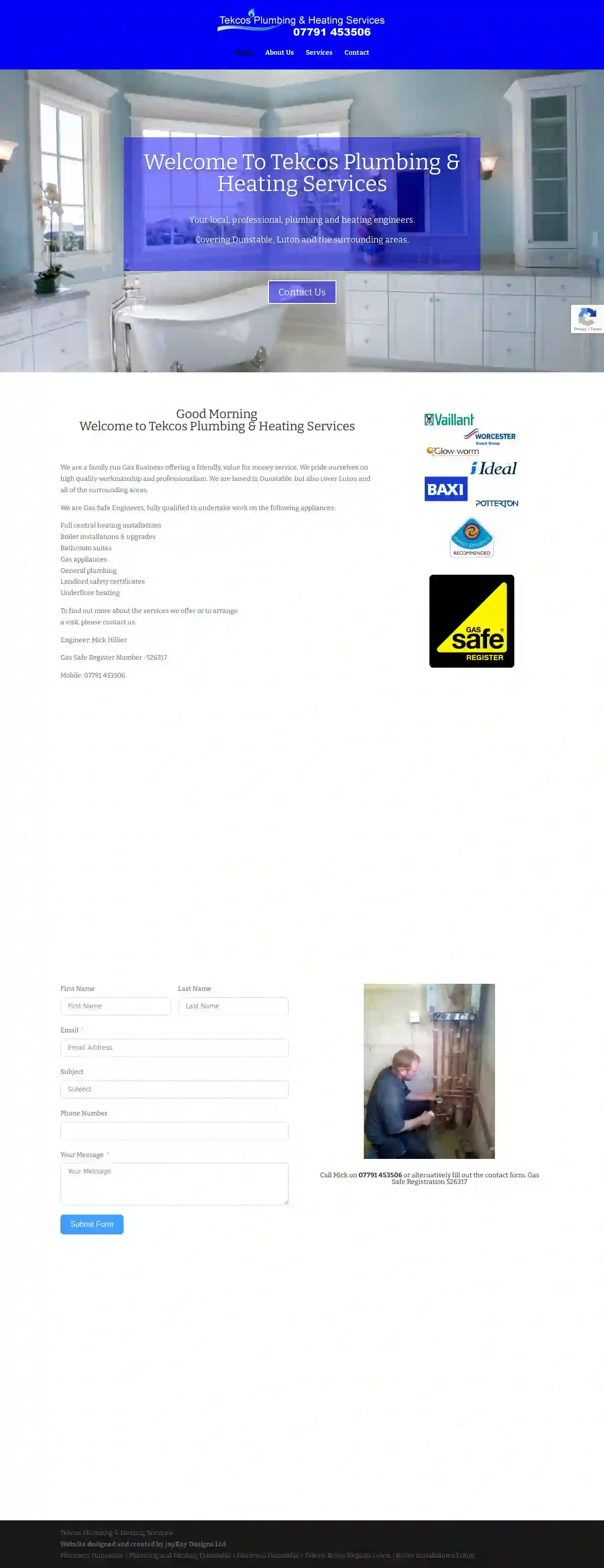
Tekcos (Plumbing & Heating & Electrical) Ltd
51 reviewsDunstable, GBWelcome to Tekcos Plumbing & Heating Services, your local, professional, plumbing and heating engineers. We specialise in boilers and all aspects of domestic plumbing and heating work. Our family run Gas Business offers a friendly, value for money service, with high quality workmanship and professionalism. We are based in Dunstable, but also cover Luton and all of the surrounding areas. We are Gas Safe Engineers, fully qualified to undertake work on the following appliances: full central heating installations, boiler installations & upgrades, bathroom suites, gas appliances, general plumbing, landlord safety certificates, underfloor heating. To find out more about the services we offer or to arrange a visit, please contact us.
- Services
- Why Us?
- Accreditations
- Our Team
- Gallery
Get Quote
Impulse Heating
56 reviewsThe Business Centre, 1000 Chester Road, Unit 10, Birmingham, B37 6AA, GBImpulse Heating Ltd is a family-run business with over 20 years of experience in the heating industry. We are based in the heart of the UK and provide a wide range of heating services to both domestic and commercial clients. Our team of highly skilled engineers is dedicated to providing our customers with the highest quality service at competitive prices. We are committed to providing our customers with a reliable and efficient service, and we are always happy to go the extra mile to ensure that they are satisfied. We offer a 24/7 emergency call-out service, so you can be sure that we are always there when you need us. At Impulse Heating Ltd, we believe that everyone deserves to be warm and comfortable in their home or business. That's why we offer a wide range of heating services, including boiler installations, repairs, and servicing. We also offer a range of other services, such as gas safety checks and power flushing. We are a Gas Safe registered company, so you can be sure that you are in safe hands. We are proud to be a family-run business, and we are committed to providing our customers with the highest level of service. We are always happy to answer any questions you may have, and we are always willing to go the extra mile to ensure that you are satisfied.
- Services
- Why Us?
Get Quote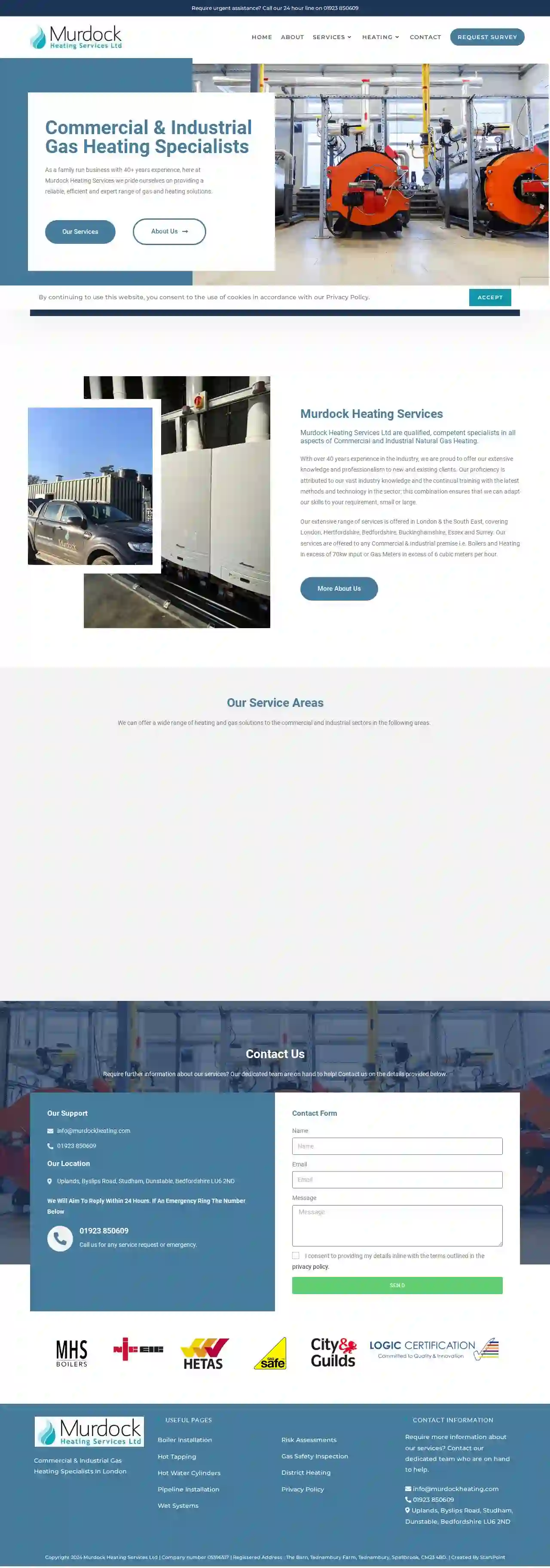
Murdock Heating Services
53 reviewsUplands, Byslips Road, Studham, Dunstable, LU6 2ND, GBMurdock Heating Services Ltd are qualified, competent specialists in all aspects of Commercial and Industrial Natural Gas Heating. With over 40 years experience in the Industry, we are proud to offer our extensive knowledge and professionalism to new and existing clients. Our proficiency is attributed to our vast industry knowledge and the continual training with the latest methods and technology in the sector; this combination ensures that we can adapt our skills to your requirement, small or large. Our extensive range of services is offered in London & the South East, covering London, Hertfordshire, Bedfordshire, Buckinghamshire, Essex and Surrey. Our services are offered to any Commercial & Industrial premise i.e. Boilers and Heating in excess of 70kw input or Gas Meters in excess of 6 cubic meters per hour. We take extreme pride in our approach; we listen to your requirements and expectations, and advise through our experience, the best viable and deliverable solution to include cost and energy efficiency. We offer an efficient, professional, and reliable service and all works are of the highest standard; as dictated by Industry Regulations. Our due diligence ensures all works meet with Health & Safety Standards and the current Legislation. Murdock Heating Services Ltd are proud to be registered with, and or members of Gas Safe Register, WRAS and IGEM. All Engineers are registered under the Murdock Heating Services Ltd Gas Safe Licence. Our qualifications have been gained with Logic and Adrian Brown Training. Our client basis is varied and works undertaken range from Fault Diagnosis to Complete Installation; building types include: Hotels, Care Homes, Stately Homes, Commercial & Industrial Manufacturing Units, Shopping Centres, Offices, large or small, Leisure Centres, and Workshops.
- Services
- Why Us?
- Accreditations
- Gallery
Get Quote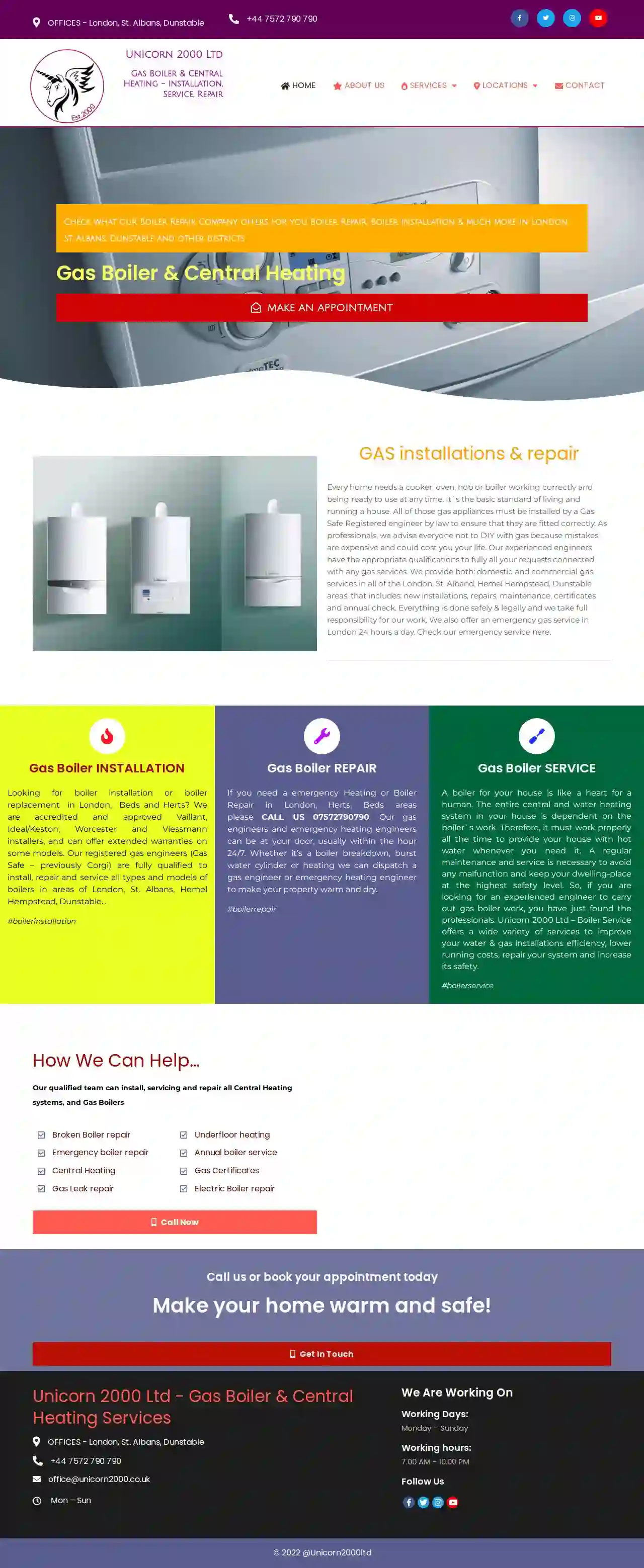
Unicorn 2000 - Gas Boiler Installation & Central Heating Services
510 reviewsDunstable, GBUnicorn 2000 Ltd is a Gas Safe registered company providing gas boiler and central heating services in London, St. Albans, Hemel Hempstead, and Dunstable. We offer a comprehensive range of services, including boiler installation, repair, and servicing, as well as central heating services for both domestic and commercial clients. Our experienced engineers are fully qualified to work on all types and models of boilers and are committed to providing safe and reliable service. We understand the importance of a working boiler for your home and offer a 24/7 emergency service to ensure you are never left without heat.
- Services
- Why Us?
- Accreditations
- Gallery
Get Quote
Heroes On Hand
4.935 reviews1st Floor Gallery Court, 28 Arcadia Avenue, 1st Floor Gallery Court 28 Arcadia Avenue, London, N3 2FG, GBWelcome to Heroes on Hand, your trusted partner for all your plumbing, gas, and heating needs in London. We understand the importance of a reliable and efficient heating system for your home and family. That's why we're dedicated to providing top-notch services, ranging from repairs and maintenance to installations of new systems. With over 15 years of experience in the industry, our Gas Safe registered engineers are highly qualified and equipped to handle any challenge. We pride ourselves on using only the highest quality parts and materials, ensuring long-lasting and reliable solutions. At Heroes on Hand, we believe in transparency and honesty. We provide upfront quotes with no hidden fees, so you can be confident in the cost of our services. Our friendly and helpful team is always ready to answer your questions and provide expert advice. We're committed to exceeding your expectations and ensuring your complete satisfaction. Whether you're a homeowner, landlord, or estate agent, we're here to help. Contact us today for reliable and affordable plumbing, gas, and heating solutions you can trust.
- Services
- Why Us?
- Accreditations
- Testimonials
- Gallery
Get Quote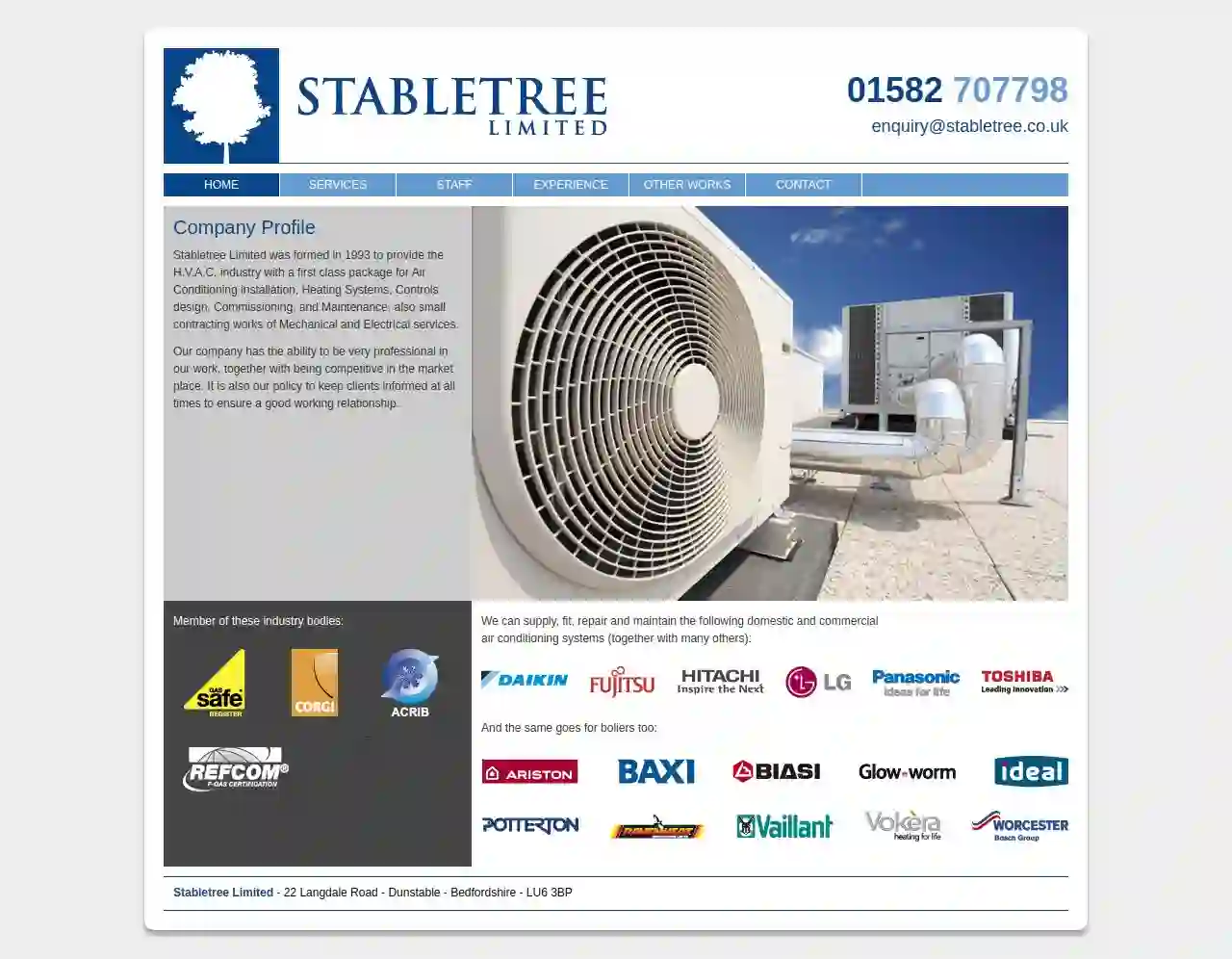
Stabletree Limited
22 Langdale Road, Dunstable, LU6 3BP, GBStabletree Limited was formed in 1993 to provide the H.V.A.C. industry with a first class package for Air Conditioning installation, Heating Systems, Controls design, Commissioning, and Maintenance, also small contracting works of Mechanical and Electrical services. Our company has the ability to be very professional in our work, together with being competitive in the market place. It is also our policy to keep clients informed at all times to ensure a good working relationship.
- Services
- Why Us?
- Accreditations
- Our Team
- Gallery
Get Quote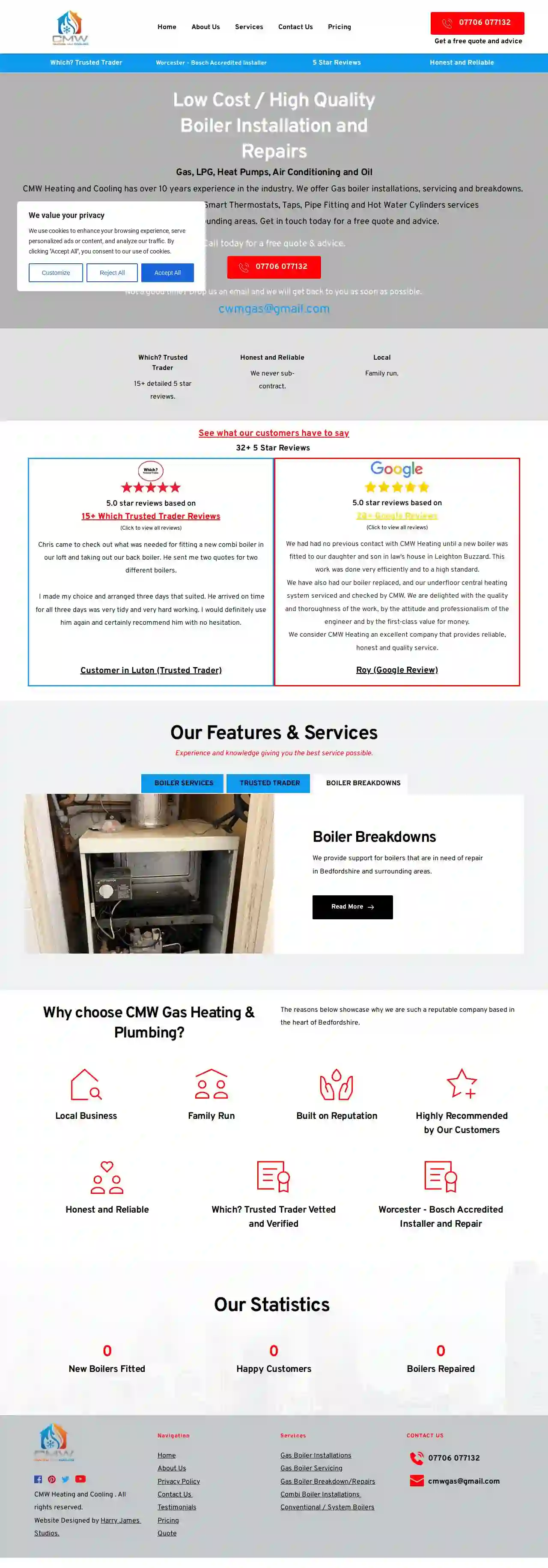
CMW Heating & Cooling
552 reviewsDunstable, GBCMW Heating and Cooling is a family-run business with over 10 years of experience in the industry. We offer a range of services including gas boiler installations, servicing, and breakdowns, as well as power-flushing and magnacleanse, smart thermostats, taps, pipe fitting, and hot water cylinders. We pride ourselves on being a reputable and honest company, with a strong reputation in the industry. We have 32+ 5-star reviews on Google and Which? Trusted Trader, and we never subcontract our work. We offer a price match guarantee on new boilers and a free boiler service for the first year. Our team is highly experienced and knowledgeable, and we are committed to delivering high-quality workmanship and exceptional customer service to every client we serve in Bedfordshire and surrounding areas.
- Services
- Why Us?
- Accreditations
- Our Team
- Testimonials
- Gallery
Get Quote
Air Conditioning & Smart Energy Solutions Ltd
512 reviewsSparrow Hall Farm, Unit 8B Barleyfields, Edlesborough, LU6 2ES, GBAir Conditioning & Smart Energy Solutions Ltd is an independent company with over 10 years of experience in the Air Conditioning Industry. We are approved installers for leading brands like Fujitsu, Mitsubishi Electric, Daikin, and Toshiba. Our team of F-Gas certified engineers are highly experienced in both commercial and residential installations. We pride ourselves on providing high-quality installations that are independently certified and accredited by Refcom. We also specialize in EV Charger Installations, undertaken by fully qualified electricians specifically trained for this purpose. We offer free surveys and fixed-cost quotations, ensuring transparency and peace of mind for our clients.
- Services
- Why Us?
- Accreditations
- Our Team
- Gallery
Get Quote
Phoenix Heating luton Ltd
4.85 reviewsBlackburn Road, Unit 5 Townsend Centre, Houghton Regis, LU5 5BQ, GBEstablished in 1985, Phoenix Heating (Luton) Ltd is a family-run business catering to all the heating and plumbing requirements of industrial and commercial establishments. Our heating engineers specialise in commercial and industrial heating, including complete boiler or plant room installation, industrial pipe fitting, gas purge and safety checks. Throughout our years of experience, we have developed a great reputation for our work on heating installation projects, providing commercial heating installations that last the test of time. We Look after Schools, Academies and colleges If you are looking for a competent company that can provide you with evidence of the correct training and certificates, we pride ourselves on working with current codification. Safe Guarding IOSH Ipaf £10M Insurance CSCS Gas Safe DBS Water Regulation Schools Hospital Churches Care homes Surgeries Offices Industrial buildings Local authorities approved
- Services
- Why Us?
- Accreditations
- Gallery
Get Quote
P Wilson Plumbing & Heating
512 reviewsDunstable, GBWe are a growing family-run business, serving our local area of Toddington, Dunstable, Luton, Leighton Buzzard, Milton Keynes and the surrounding area. We have over 20 years experience within the industry and tailor our service to each individual customer. We take pride in our work and our reputation. This is an amazing family-run business. They totally understand how personal a bathroom is and are there on hand to give professional advice as you sort through all the options. The team on site have got it down to a fine art. Their work is of the highest quality and they stick to the schedule. I cannot recommend them highly enough. Absolutely lovely. Anita Brathwaite Honest • Local • Reliable Our mission is simple: to provide high-quality services for our valued clients. Our team goes above and beyond to cater to each project’s specific needs. Through open communication and exceptional service, we hope you’ll find what you’re looking for with our Plumbing and Heating Services. For more information or general inquiries, get in touch today.
- Services
- Why Us?
- Testimonials
- Gallery
Get Quote
Over 12,692+ HVAC Contractors on our directory
Our HVAC contractors operate in Potton and surroundings!
HVACCompaniesHub has curated and vetted the Best HVAC Businesses in Potton. Find a top & trustworthy pro today.
Frequently Asked Questions About Emergency HVAC Services
- Control Humidity: Keep indoor humidity levels between 30% and 50%.
- Regularly Change Air Filters: Change your air filters frequently.
- Clean Drip Pans and Condensate Drains: Regularly inspect and clean your AC unit's drip pans and condensate drains to prevent standing water.
- Ensure Proper Ventilation: Adequate ventilation helps to reduce moisture buildup.
- Schedule Professional Duct Cleaning: Consider regular air duct cleaning to improve indoor air quality.
- Safety First: If you suspect a gas leak or any electrical hazard, evacuate your home or building immediately and contact your utility company or emergency services.
- Turn Off Your System: Turn off your HVAC system at the thermostat to prevent further damage.
- Document the Issue: If possible, take photos or videos of the problem to show the technician.
- Gather Information: Have your HVAC system's model and serial number readily available, along with any warranty information.
- Clear Access: Ensure clear access to your HVAC system for the technician.
- Prepare Questions: Write down any questions you want to ask the technician.
- MERV Rating: The Minimum Efficiency Reporting Value (MERV) indicates the filter's ability to trap particles. Higher MERV ratings mean better filtration.
- Filter Size: Make sure you select the correct size filter for your HVAC unit.
- Filter Type: Different types of filters are available, including pleated filters, HEPA filters, and electrostatic filters.
- Your Needs: Consider your indoor air quality needs. If you have allergies or pets, a higher MERV filter may be beneficial.
How can I prevent mold in my HVAC system?
What should I do while waiting for an emergency HVAC technician?
What is a zoning system, and do I need one?
How do I choose the right HVAC filter?
How can I prevent mold in my HVAC system?
- Control Humidity: Keep indoor humidity levels between 30% and 50%.
- Regularly Change Air Filters: Change your air filters at least every three months.
- Clean Drip Pans and Condensate Drains: Regularly inspect and clean your AC unit's drip pans and condensate drains to prevent standing water.
- Ensure Proper Ventilation: Adequate ventilation helps to reduce moisture buildup.
- Schedule Professional Duct Cleaning: Have your ducts professionally cleaned every few years to remove mold and other contaminants.
What should I do while waiting for an emergency HVAC technician?
- Safety First: If you suspect a gas leak or any electrical hazard, evacuate your home or building immediately and contact your utility company or emergency services.
- Turn Off Your System: Turn off your HVAC system at the thermostat to prevent further damage.
- Document the Issue: If possible, take photos or videos of the problem to show the technician.
- Gather Information: Have your HVAC system's model and serial number readily available, along with any warranty information.
- Clear Access: Ensure clear access to your HVAC system for the technician.
- Prepare Questions: Write down any questions you want to ask the technician.
What is a zoning system, and do I need one?
How do I choose the right HVAC filter?
- MERV Rating: The Minimum Efficiency Reporting Value (MERV) indicates the filter's ability to trap particles. Higher MERV ratings mean better filtration.
- Filter Size: Make sure you select the correct size filter for your HVAC unit.
- Filter Type: Different types of filters are available, including pleated filters, HEPA filters, and electrostatic filters.
- Your Needs: Consider your indoor air quality needs. If you have allergies or pets, a higher MERV filter may be beneficial.